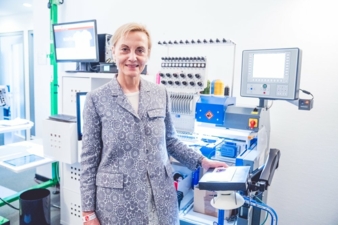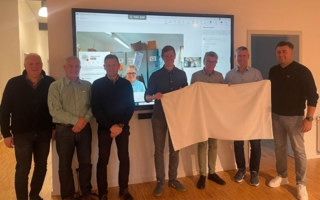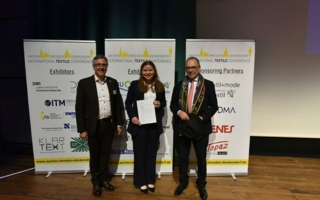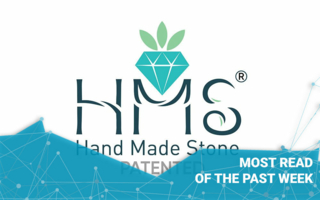17/05/2018 – Editorial — auf Deutsch lesen
Networked textiles!
It’s here at last – the future of our industry has its very own showroom. It enables visitors to experience the digital textile world first hand.
Located in the premises of the Textile + Fashion Confederation in Berlin, it enables visitors to experience the digital textile world first hand. Textil vernetzt is a government funded competence centre for SMEs, which explores digitalisation in the textiles industry. It uses a networked embroidery machine to illustrate the four main areas of interest: digitalisation of processes (systematic digital engineering), networked production, Work 4.0 (assistance systems), smart sensor technology.
In a nutshell, this is how it works:
The customer orders (e.g. from an online store) a textile with bespoke embroidery. Completion of the buying process triggers an automatic or at least automatically supported production process in the manufacturing facility. A barcode, which is printed out on receipt of the order and is scanned at every production stage, provides all the necessary information, machine settings etc., precisely when they are needed. This almost reduces to zero the error rate in production. Equipped with a tablet, the user receives instructions on how to clamp the textile or how to deal with thread breakages. Sensors on the machine compile data in real time. Maintenance work can be planned in advance and malfunctions can be eradicated more quickly.
Digital SMEs?
The competence centre Textil vernetzt is one of twenty-three centres set up by the German Federal Ministry for Economic Affairs and Energy. They are designed for demonstrations and for disseminating information, whilst providing SMEs and the trades across the country with valuable support as they embrace digitalisation, networking and the application of Industry 4.0. The centres can be accessed free of charge.
The aim?
The idea is for new information, practical knowledge about digitalisation, the implementation of Industry 4.0 and the networking of operational processes to be brought together, developed further and translated into the industry vocabulary of specific sectors. Managed by the Textile + Fashion Confederation, Textil vernetzt is the relevant SME 4.0 competence centre for the textiles industry. Other partners involved in this centre include the Institute of Textile Technology (ITA) at RWTH Aachen University, the German Institutes for Textile and Fibre Research Denkendorf (DITF), Saxon textile research institute Sächsisches Textilforschungsinstitut Chemnitz e.V. and the society of applied research Hahn-Schickard-Gesellschaft für angewandte Forschung e.V. in Stuttgart.
Four showcases – one showroom!
Textil vernetzt comprises four “shop windows”, each with a different focus, and the abovementioned showroom in Berlin, which reflects the breadth of the “shop windows”. All the locations, be it in Berlin, Aachen, Stuttgart, Denkendorf or Chemnitz, allow visitors to experience different digital solutions for further developing production and products. Presentations by experts shed light on new trends, whilst lab tours explain technical possibilities and practical workshops invite participants to try out new solutions. Roadshows and Innovation Workshops at companies provide on-site guidance as well as support with networking and developing new business models. Web-based support has also been put in place in the form of learning platforms and webinars.
Focal points
The DITF in Denkendorf has expertise in customised products in the fields of apparel, smart textiles and lightweight construction.
Visitors to the ITA in Aachen can marvel at a networked, fully integrated textile production chain and learn about the commercial benefits of digitalisation.
The STFI in Chemnitz demonstrates vertical integration, networked production systems and resource efficiency, e.g. through self-optimisation of complex machinery.
Hahn-Schickard-Gesellschaft in Stuttgart sheds light on cross-industry applications for smart sensor systems.
The human element
Digitalisation marks the advent of a new era. Federal Education Minister Anja Karliczek recently stated in an interview (cf. GT, 23.4. 2018, p. 5): “People are at the forefront and right in the middle of digitalisation. ...To come out winning, we have to start moving now, in fact, we have to jump – and we all have to do it together. From one step up to the next.”
The future is textile! The future is digital! We will continue to keep you posted. Stay tuned!




